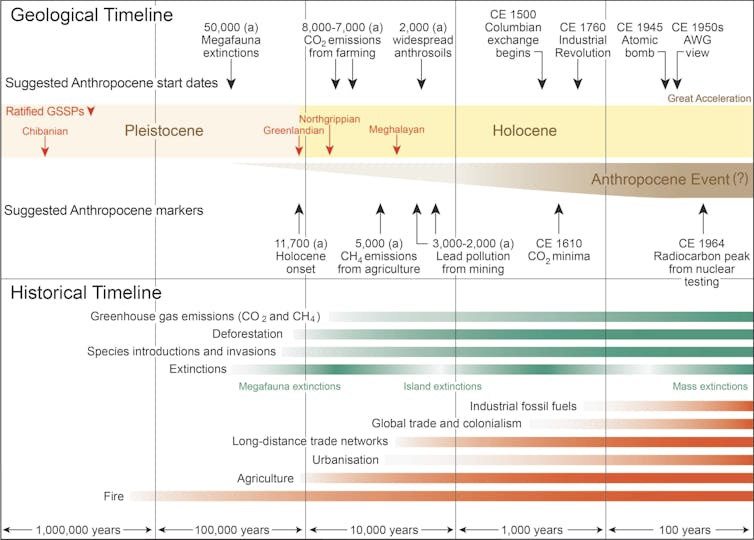[ad_1]
When folks speak concerning the “Anthropocene,” they usually image the huge impression human societies are having on the planet, from speedy declines in biodiversity to will increase in Earth’s temperature by burning fossil fuels.
Such huge planetary modifications didn’t start unexpectedly at any single place or time.
That’s why it was controversial when, after over a decade of examine and debate, a world committee of scientists – the Anthropocene Working Group – proposed to mark the Anthropocene as an epoch within the geologic time scale beginning exactly in 1952. The marker was radioactive fallout from hydrogen bomb exams.
On March 4, 2024, the fee chargeable for recognizing time items inside our most up-to-date interval of geologic time – the Subcommission on Quarternary Stratigraphy – rejected that proposal, with 12 of 18 members voting no. These are the scientists most skilled at reconstructing Earth’s historical past from the proof in rocks. They decided that including an Anthropocene Epoch – and terminating the Holocene Epoch – was not supported by the requirements used to outline epochs.
To be clear, this vote has no bearing on the overwhelming proof that human societies are certainly remodeling this planet.
As an ecologist who research world change, I served on the Anthropocene Working Group from its begin in 2009 till 2023. I resigned as a result of I used to be satisfied that this proposal outlined the Anthropocene so narrowly that it could injury broader scientific and public understanding.
By tying the beginning of the human age to such a latest and devastating occasion – nuclear fallout – this proposal risked sowing confusion concerning the deep historical past of how people are remodeling the Earth, from local weather change and biodiversity losses to air pollution by plastics and tropical deforestation.
The unique thought of the Anthropocene
Within the years because the time period Anthropocene was coined by Nobel Prize-winning atmospheric chemist Paul Crutzen in 2000, it has more and more outlined our occasions as an age of human-caused planetary transformation, from local weather change to biodiversity loss, plastic air pollution, megafires and far more.
Crutzen initially proposed that the Anthropocene started within the latter a part of the 18th century, as a product of the Industrial age. He additionally famous that setting a extra exact begin date could be “arbitrary.”
In accordance with geologists, we people have been dwelling within the Holocene Epoch for about 11,700 years, because the finish of the final ice age.
Human societies started influencing Earth’s biodiversity and local weather by means of agriculture hundreds of years in the past. These modifications started to speed up about 5 centuries in the past with the colonial collision of the previous and new worlds. And, as Crutzen famous, Earth’s local weather actually started to vary with the rising use of fossil fuels within the Industrial Revolution that started within the late 1700s.

Philip Gibbard, et al., 2022
The Anthropocene as an epoch
The rationale for proposing to outline an Anthropocene Epoch beginning round 1950 got here from overwhelming proof that most of the most consequential modifications of the human age shifted upward dramatically about that point in a so-called “Nice Acceleration” recognized by local weather scientist Will Steffen and others.
Radioisotopes like plutonium from hydrogen bomb exams performed round this time left clear traces in soils, sediments, bushes, corals and different potential geological information throughout the planet. The plutonium peak within the sediments of Crawford Lake in Ontario, Canada – chosen because the “golden spike” for figuring out the beginning of the Anthropocene Epoch – is properly marked within the lake mattress’s exceptionally clear sediment report.
The Anthropocene Epoch is lifeless; lengthy reside the Anthropocene
So why was the Anthropocene Epoch rejected? And what occurs now?
The proposal so as to add an Anthropocene Epoch to the geological time scale was rejected for a wide range of causes, none of them associated to the truth that human societies are altering this planet. In reality, the other is true.
If there’s one fundamental cause why geologists rejected this proposal, it’s as a result of its latest date and shallow depth are too slender to embody the deeper proof of human-caused planetary change. As geologist Invoice Ruddiman and others wrote in Science Journal in 2015, “Does it actually make sense to outline the beginning of a human-dominated period millennia after most forests in arable areas had been minimize for agriculture?”
Discussions of an Anthropocene Epoch aren’t over but. However it is vitally unlikely that there will likely be an official Anthropocene Epoch declaration anytime quickly.
The dearth of a proper definition of an Anthropocene Epoch is not going to be an issue for science.
A scientific definition of the Anthropocene is already broadly accessible within the type of the Anthropocene Occasion, which principally defines Anthropocene in easy geological phrases as “a fancy, transformative, and ongoing occasion analogous to the Nice Oxidation Occasion and others within the geological report.”
So, regardless of the “no” vote on the Anthropocene Epoch, the Anthropocene will proceed to be as helpful because it has been for greater than 20 years in stimulating discussions and analysis into the character of human transformation of this planet.
This text was up to date to make clear {that a} new try at an official Anthropocene Epoch declaration is unlikely quickly.
[ad_2]
Source link



